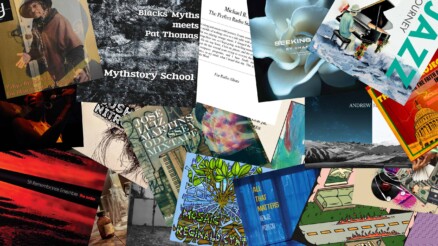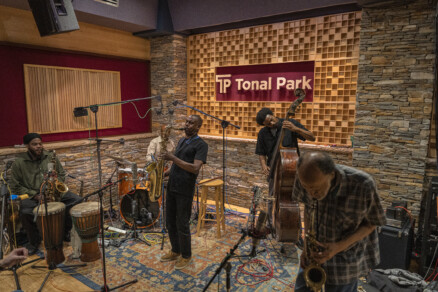Interview | George Burton, a pianist on the rise, bridges the divide between manifold influences


by Giovanni Russonello
Editorial board
In the kitchen sink of his creative mind, George Burton keeps two faucets running. One flows in a steady, straight-ahead stream, situating itself inside the rooted logic of jazz’s swinging tradition; the other gargles out in a mélange of electric and acoustic sounds, slippery and concrete at the same time. Both faucets run warm to hot.
Burton, a young pianist on the rise who will headline at Bohemian Caverns this weekend, leads both a straight-ahead quintet and a blurrier, more modern-sounding group called Group 5, where the slicing power plays of vintage rock pull against sprawling auras and graceful totems of harmony. Inevitably, the two groups don’t sound as different as it might seem; the more traditional band often slips into pattering grooves, and Group 5 knows its way around a John Coltrane-like, skyward solo.
Burton hails from Philadelphia but has spent the past 10 years on the New York City scene. He got his jazz education the traditional way—kind of. He grew up hearing gospel at home and in church, and as a teenager he sought the guidance of his hometown jazz aristocracy: Tim Warfield,Terell Stafford, Odean Pope. He has played in Pope’s band for the past decade, learning how to keep the jazz tradition in the back of his brain – like the underlying structure of a ballad – even while tearing holes in its walls.
But Burton was always fascinated with Western classical music, having started violin lessons at age four, and bands at the fringe of popular indie rock – Sigur Rós, Björk and others. He and I connected via phone this week to discuss how he puts it all together, what he has learned from his hometown heroes, and what his auspicious future might hold.
CapitalBop: You came up taking in a lot of types of music: classical, gospel, indie rock, jazz. With your own bands, do you find yourself ever having to conscientiously decide, “Okay, I am hearing something very outlandish here, that might not fit, so I’m going to actually cut away some of those influences and get at the core of what I think this song or this band needs”?
George Burton: To me it’s not really that hard. But what I’ve had to do with all my different bands is, I’ve been using the same type of personnel in each group: like-minded thinkers. They keep me in a certain place. When I’m playing with the Group 5 band it’s a whole different way of thinking, so I don’t really get too lost in the different styles. The largest problem I have is when I’m playing with trio. It gets interesting because [in that setting] I can go any way I want to go.
Sometimes it can be a good thing and sometimes it can be scary. I can do whatever I want – we’re just the three, and with the trio that we don’t have to abide by any rules about what’s going to happen. With the larger groups it’s similar, but I can’t be just as scatterbrained as I want.
CB: Who’s in that trio?
GB: It’s usually Ryan Berg, a bass player in NY, and Bean [Jeremy Clemons.]
CB: Talk about that synergy.
GB: It’s like we’re always listening to each other. Sometimes … it’s like, “Stop listening to me so much and just play!” In all the other groups I’ve played with, there’s always one person that’s listening a little bit more than everybody else. Sometimes it’s like the bass player is listening a bit more, other times it’s the drummer. In this particular case it’s the only situation where everyone’s listening to each other equally.
CB: Are there other trios that you feel operate like that, and you can identify as inspirations?
GB: I think Brad [Mehldau]’s trio is like that – definitely Jason [Moran]’s trio….
CB: Odean Pope is one of those creative thinkers who move the music forward by their own ethos, while also maintaining an identity as a leader in a local jazz community. As a result of his dedication to Philadelphia, he’s been unjustly overlooked nationally, and globally. But tell me what you’ve learned from working with him – what’s that experience been like?
GB: I’ve been playing with him for about 10 years. When you get to play with somebody that long, and they’re that experienced, it’s kind of like he’s my uncle – the best jazz uncle you could ever have. He’s from the tradition so much that he could never get it out of his system, but he’s always trying to be himself. He never tries to be like anyone else, never tries to sound like Coltrane….
He’s always taught me that: Play whatever you’re thinking. Don’t worry about playing every note to the “T.” … I got a call from him a month ago, and he was telling me to keep doing what I was doing. After 10 years, I had never heard him say something like that. He was always saying, “Try this, try that.” He said, “You’re sounding like yourself finally. Keep doing what you’re doing.” … That meant a lot.
CB: Tim Warfield is another guy who’s from the Philly scene, and he’ll be in the quartet you’re bringing to the Caverns this weekend. How do the relationships from your hometown continue to hold together, even though you’ve moved to New York?
GB: I met Tim Warfield and Terell Stafford together – it was like the late ’90s at the time. They literally watched me grow up. When I met them I was playing violin, I wasn’t playing much jazz piano. They told me, “Alright, play piano.” … They gave me CDs to listen to. They became my big brothers. You never get too far away from people like that: You keep talking to them because you’re on the same wavelength, you like the same music. So we keep talking….
Everybody from Philly is so close – a little too close, I like to say, because everybody knows everything about everybody else. [Warfield and Stafford] raised a bunch of us – Jonathan [Blake], Jaleel Shaw, Orrin [Evans], a whole bunch of cats.
CB: What’s next? You have two albums in the pipeline – when are they coming out?
GB: I recorded a quintet album in April, with Terell and Tim and Rodney Green [on drums] and Luques Curtis [on bass]. I’m finishing up a recording with Group 5, and Derrick Hodge is going to produce that. I have a bunch of gigs coming out, and we’ll just see what happens.
—
The George Burton Quartet performs at Bohemian Caverns this Friday and Saturday, for 8:30 and 10:30 p.m. sets both nights. Tickets cost $18 in advance, or $23 at the door, and can be bought here. More information is available here.
DC, DC jazz, George Burton, Odean Pope, Tim Warfield, Washington


